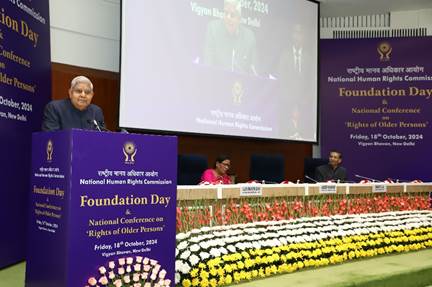NHRC Foundation Day and National Conference on the Rights of Older Persons
The National Human Rights Commission, NHRC, India, organized a function and a national conference on the rights of older persons to celebrate its 31st Foundation Day at Vigyan Bhawan, New Delhi today. The Commission was set up on 12th October in 1993. Addressing the function as the Chief Guest, the Vice President of India, Shri Jagdeep Dhankhar said that Bharat’s human rights record is unmatched. The country is way ahead of other nations when it comes to preservation of human rights, particularly of minorities, marginalized and vulnerable sections of society. Isolated incidents cannot define India and its human rights record. He criticized the tendency of certain entities to manipulate human rights as a tool of foreign policy to exert power over others. The Vice-President highlighted Bharat’s extraordinary role as a civilizational custodian of human rights while expressing concern over the global silence on human rights violations in other parts of the world.
Shri Dhankhar said that every citizen of the country has to be a champion of human rights and ensure nobody manipulates them financially. The national interest should not be seen with political prism but by partisanship. He also cautioned against pernicious forces working to malign Bharat’s human rights record unfairly, domestically and internationally. He said that Indian scriptures are the charters of human way of life- a repository of knowledge on human life.
The Vice President said that India continues to feed over 850 million people since the time of COVID-19 pandemic with free rations irrespective of colour, caste and class. Those who talk of India’s hunger situation need to reflect upon themselves. Equality before law is demonstrated in the country. The world needs to know about it and how the direct transfer of benefits to the beneficiary’s account has neutralized corruption in the country.
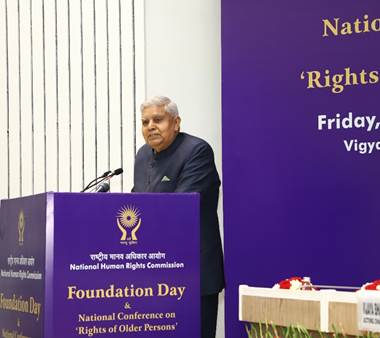
Shri Dhankhar highlighted the transformative decade of non-discriminatory development in India improving the quality of life of every section of society irrespective class, caste, demography. He said that in the last decade, India’s economic growth has been exponential, incremental, unstoppable and it is not pyramidical. Everyone is getting the benefit. Affordable housing, gas connection, tap water, internet connectivity, road connectivity, and this is non-discriminatory progress. He emphasized that no developmental project has ever been dictated by circumstances other than those that serve the ultimate cause of human rights.
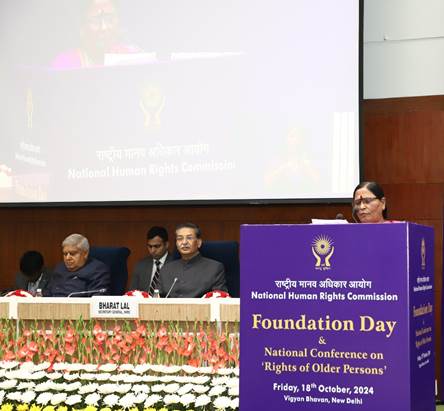
Earlier, the NHRC Acting Chairperson, Smt Vijaya Bharathi Sayani said that the Commission plays a crucial role in ensuring dignity, freedom, and well-being for all by raising awareness about human rights and fostering empowerment of the marginalized including Transgender persons. This is to help them to assert their entitlements and contribute to national progress. It also emphasizes the need for environmental rights, urging sustainable practices and accountability for pollution. Celebrating its Foundation Day and achievements, reminds us to remain committed to uplifting vulnerable groups, prioritizing their human rights with compassion for their unique situations.
She said that India’s progress as a nation is closely tied to its commitment to human rights, deeply embedded in our civilization and enshrined in our Constitution. Respect for individual dignity is central to the Indian ethos, rooted in ancient texts like the Vedas and the Gita. As a home to one-sixth of humanity, India is becoming a role model for the world in promoting individual dignity and freedom. Our rich cultural tapestry showcases our strength in diversity.
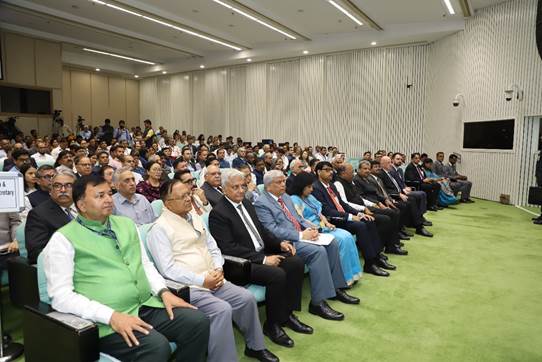
The NHRC Acting Chairperson said throughout its history, the NHRC, India has addressed landmark cases and made significant recommendations to uphold human rights in the country. The Commission addresses a broad spectrum of human rights violations, including custodial deaths, bonded labor, exploitation of marginalized groups, and denial of medical care. It has highlighted systemic law enforcement issues, advocating for essential police reforms while dealing with cases of custodial violence.
She said that the Commission responded to grave reports of harassment and sexual assault against women in Sandeshkhali, West Bengal. A spot inquiry conducted by the NHRC revealed a climate of fear and intimidation that prevented victims from seeking justice.
Smt Vijaya Bharathi Sayani said that the NHRC conducted independent inquiries alongside addressing complaints, investigating human rights violations in 30 cases over the past year. It also conducted spot visits to facilities such as prisons, schools, and health centers. These efforts help monitor the implementation of government programs and identify areas for improvement. To enhance the Commission’s oversight, it’s Special Rapporteurs and Monitors focus on critical issues like police reforms, children’s rights, and health.
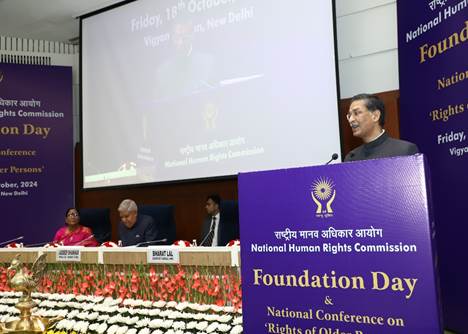
The NHRC Secretary General, Shri Bharat Lal in his welcome address said that the Commission fosters a culture of respect and dignity for all. Giving a glimpse of the Commission’s wide mandate, he said that in the last one year, more than 68 thousand complaints were registered and almost 70 thousand were disposed of and more than 17 crore to the aggrieved and their next of kin.
Shri Lal said that the NHRC’s national consultations, core group meetings and open house discussions are another mechanism by which it engages with stakeholders such as government officials, members of NGOs and CSOs, human rights defenders, and subject matter experts. To highlight the challenges faced by women in workplaces, the Commission also hosted a National Symposium on Women’s Safety at Work and Public Spaces, which was attended by key stakeholders. The protection and rehabilitation of individuals engaged in begging, for the Rights of the Widows, and Rights of Children against Child Sexual Abuse Material (CSAM) were some of the latest advisories in last one year.
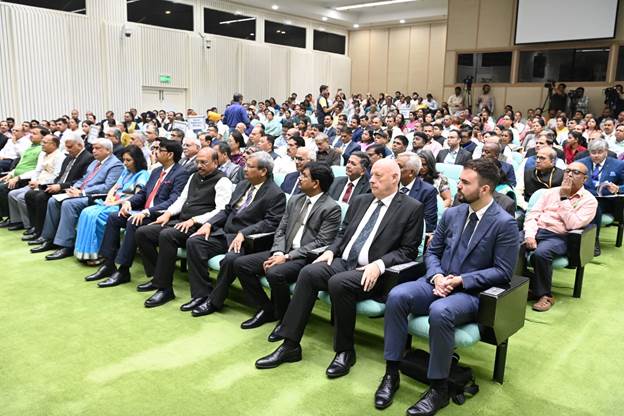
Shri Lal said that the NHRC, India works closely in collaboration with other national commissions, their counterparts in states, and state human rights commissions. It also plays a vital role in promoting human rights discourse in various international forums. It is a founding member of the Asia Pacific Forum of Human Rights and has been proactive in building South-South ties with other National Human Rights Institutions to foster human rights across borders. The Commission also has prominent representation at various other international human rights forums, including the Commonwealth Forum of National Human Rights Institutions (CFNHRI) and the Global Alliance for National Human Rights Institutions.
Members of State Human Rights Commissions, members of Judiciary, diplomats, NHRC senior officers, Special Rapporteur & Monitors, senior government functionaries, civil society representatives, human rights defenders, among other national and international dignitaries, attended the function.

